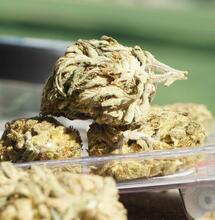Answers to 10 Commonly Asked Questions About Marijuana
_7.jpg)
If you’re new to marijuana, likely you’ve heard a lot of rumors and contradicting anecdotes from friends and family. This can leave a person confused and seeking answers. Well, we have some answers to the 10 most commonly asked questions about the consumption of marijuana. Read on and hopefully your question will be answered.
1. What is it Like to be High?
Ask ten people this question and there will likely be ten different answers. Just like not everyone feels the same way when they get drunk – some people get silly and others get angry – cannabis affects different people in dissimilar ways. That said, there are some common feelings reported by a number of users. Some experience altered perceptions of time, increased silliness and laughter, increased creativity, increased hunger, and sleepiness or sedation. Some report feelings of euphoria.
2. Is Marijuana bad for me?
Again, there is no particularly easy way to answer this question. Studies on long-term use have been inconclusive. However, the use of cannabis in moderation has shown no long-term brain or lung damage and is not associated with cancers. However, excessive use before the age of sixteen and the use of cannabis by those with psychiatric disorders is concerning to public health officials.
3. Does Cannabis Damage the brain?
This question has left researchers stumped. Previous studies thought to have shown a correlation between cannabis consumption and lower IQ have been discarded. More recent studies showed no difference between cannabis consuming and non-cannabis consuming identical twins. Smoking copious amounts prior to adulthood has shown to have some effect. However, pot has shown some protective qualities in the brains of adults. Pharmaceutical companies are exploring these positive neurological effects.
4. Is There a Difference in The High from Smoking Weed and Vaping Weed?
This is another one of those different experience questions. Some people have tried vaping and claimed that they have not gotten “high” but get high from smoking a joint or a bowl. However, it is important to note that vaporizing your buds using a vape pen or mod or a desktop vaporizer makes more efficient use of the cannabinoids in them – more are released versus smoking, where many are simply carbonized. So, while the high may or may not be different, you theoretically use less weed when you vape to get the same high as when you smoke.
5. Will Smoking Weed Damage My Lungs?
Yet another yes and no question. Yes, breathing in superheated smoke can irritate the lungs, resulting in a cough. Smoking resin can cause you to cough up mucous and experience some symptoms of bronchitis. However, these symptoms are usually short lived and go away when you quit smoking and switch to other consumption methods. Studies have failed to link the consumption of cannabis regularly to an increased chance of lung cancer.
6. Does Cannabis Make You Lazy?
Here, we have actual scientific evidence that says.. maybe. A recent study observed a decrease in motivation to complete tasks when comparing a group who had inhaled marijuana and those who had not. Even when money was involved – with higher monetary values assigned to more vigorous tasks – those who inhaled cannabis chose lower-effort tasks, despite being offered more cash for harder tasks. However, these effects are probably reversible once the smoker has stopped consuming cannabis.
7. What Are Strains of Marijuana?
Not all buds are created equal. Flowers from different strains of pot – say Acapulco Gold and OG Kush for example, can produce profoundly different effects when smoked. Some strains do not produce the “high” one would expect from Cannabis and others can be bred to promote creativity and energy. Knowing the effects of the different kinds of marijuana can go a long way in finding the right strain for you.
8. How are THC and CBD different?
Like we mentioned above, some plants do not produce the psychoactive high that one expects. It is likely that these strains are high in cannabidiol, or CBD. CBD has proven successful recently in the treatment of childhood epilepsy. Tetrahydrocannabinol, or THC, is the compound that reacts with certain receptors in your brain to give the mind-altering effects.
9. What Is the Difference Between Medical and Recreational Cannabis?
Medical cannabis can be used recreationally and recreational cannabis can be used medically. The biggest difference is that medical cannabis can come in the form of tinctures, salves, and purer forms than recreational cannabis. Most recreational users are chasing after that THC high while many medicinal marijuana users want high CBD varieties. However, some recreational users also prefer high-CBD buds for pain and taking the edge off.
10. Do You Get Hungry When You Get High?
Munchies are a thing that every stoner has experienced. And science has finally proven it – or, sort of. To explain this, you need to know that our brain produces its own cannabinoids. These chemicals help to regulate things like hunger. When we consume THC, the receptors for those chemicals bond with the THC, and it can result in flipping the hunger switch, telling your brain that you are hungry. Scientists were able to prove this effect in mice. While a similar effect would stand to reason in humans, scientists have not yet tested Also, cannabis enhances our taste receptors, making food taste more intense. There they are. Ten answers to ten commonly asked questions about the consumption of cannabis. Hopefully, your question was answered. But take note – marijuana is currently a Schedule I drug, which makes it hard for medical researchers to get their hands on it. Rescheduling the drug to Schedule II would prompt more medical research, answering your questions in a more in depth, scientific way. Author: Michael is a marketing and creative content specialist at GotVape.com with primary focus on customer satisfaction. Technology and fitness combined healthy lifestyle obsession are his main talking points.



